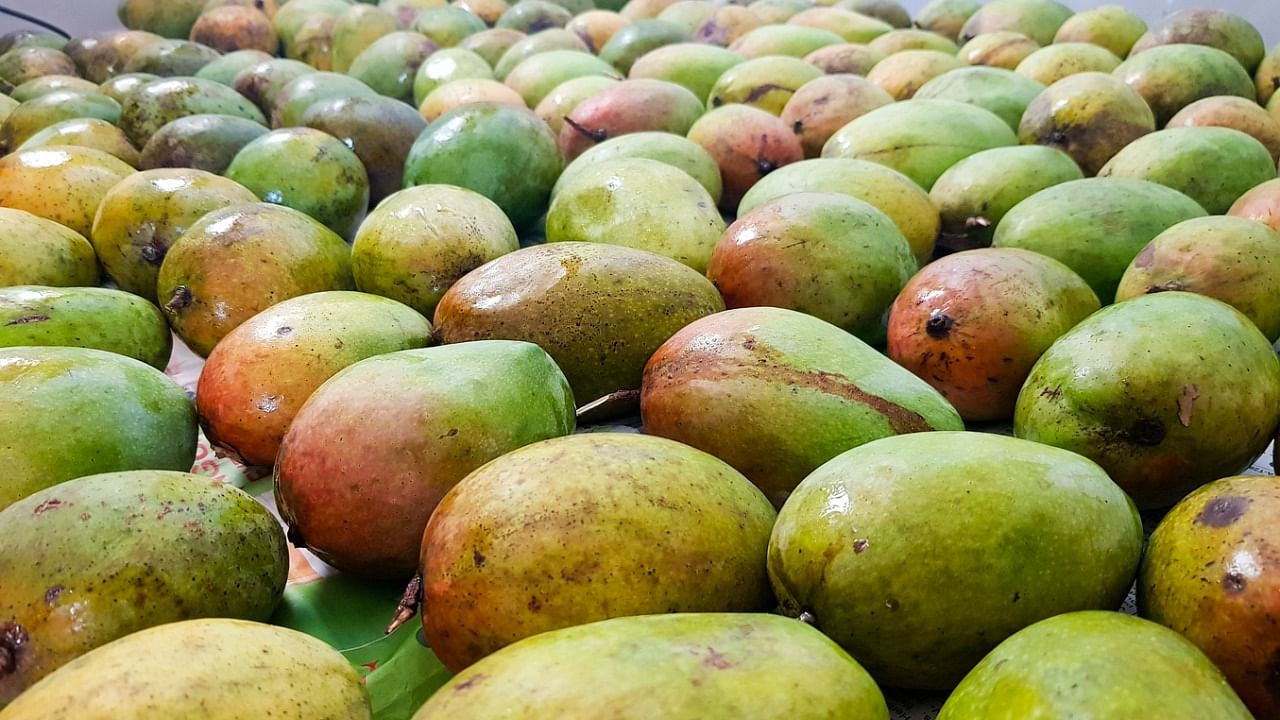
Call it the end of a delightful hegemony or new challengers emerging, but a revolution of sorts has happened in the Konkan region -- they have become rich grounds of cultivation of the King of Mangoes -- Alphonso (Hapus). The original growing areas of Indian Alphonso: Devgadh, Ratnagiri, Sindhudurg and Thane in Maharashtra, have severe competition from the Alphonso grown in Northern Karnataka areas including Mundgod, Haliyal and Dandeli.
Alphonso mangoes are traditionally cultivated in Maharashtra, growers from the Konkan coast acquired Geographical Indication Tag in 2018 and Devgadh Hapus got its own GI tag in 2020. “This recognition has made them even more special and worth more. Now, with Karnataka growers also turning in crops grown in North Karnataka orchards to the Alphonso market every year, the prices are coming down during the peak Alphonso period. Though this did not have any effect on the trade both domestic and export, it did make a dent in quality assessment by the consumer. The exporters and domestic market functionaries have begun repacking the Maharashtrian Alphonso consignments with few pieces of Alphonso grown in Karnataka to balance the cost, demand and supply factors,” says Madhav Lele of Lele Alphonso Mango orchards in Devgadh.
Karnataka’s Alphonso farming has brought down the prices of mangoes from Rs. 1,600-1,800 for a box of 12 Alphonso mangoes to Rs 1,200 at the beginning of the season to Rs 300 to 350 in the peak season. Not only the price, but the distribution of Alphonso mangoes has spread to all parts of Karnataka, Kerala and Tamil Nadu.
These orchards began taking shape in Mundgod, Haliyal, Dandeli and also Kolar about six years ago and now they are in full bloom and the output has surprised the market functionaries. Over 22,000 hectares have been brought under Alphonso cultivation in North Karnataka and in Kolar districts and according to the Horticulture department. This move towards Alphonso cultivation was unprecedented and in the next five years or so, Karnataka might have one lakh hectares under Alphonso cultivation.
Horticulture activists from the Uttara Kannada district are also engaged in another fight over the expansion of the Alphonso variety. “As a result of this directionless growth, farmers are replacing other traditional varieties of mangoes such as Kalishad, Pairi, Dilshad and wild mangoes of Uttara Kannada district. This is not a healthy development when it comes to conservation of fruit diversity,” B V Patil an advocate for local varieties of mango said.
A legal battle between the two Alphonso growers in Karnataka and Maharashtra is in the offing. “Alphonso grown in Devgadh and Ratnagiri have GI tags. Any other area in the country growing Alphonso is not authorised. The debate is on if Alphonso is a generic name or a brand name. It is not just Karnataka, even in areas bordering Karnataka and Andhra Pradesh, farmers have switched to grow Alphonso in addition to Benisha and Neelam. In Andhra Pradesh and eastern Karnataka, the growers of Alphonso from Madanpalli sell Alphonso. Agents from Mumbai, Pune, Bengaluru, Mysuru and Mangaluru pick up stock from Mandis in Madanpalli. We cannot stop Aphonso growing as a brand, but the traders must not infiltrate Alphonso mangoes grown in different areas into the basket of brands that have GI tags,” said the counsel of Konkan Hapus Amba Utpadak Ani Vikrate Sangh.
However, the Karnataka growers made a strong point, “no grower has claimed that they are selling either Devgadh or Rathnigiri Hapus (Alphonso). After we deliver our produce to the APMC or the private mandis, we do not track the movement of our mangoes,” says a farmer in North Karnataka. The All India Mango Growers Association (AIMGA) in Uttar Pradesh had also a similar piquant situation in the case of its famous Langra mangoes which is also now cultivated in Bhagalpur in Bihar, and in the case of Banganpally of Andhra Pradesh which is cultivated in Kerala.
(The writer is a senior journalist)